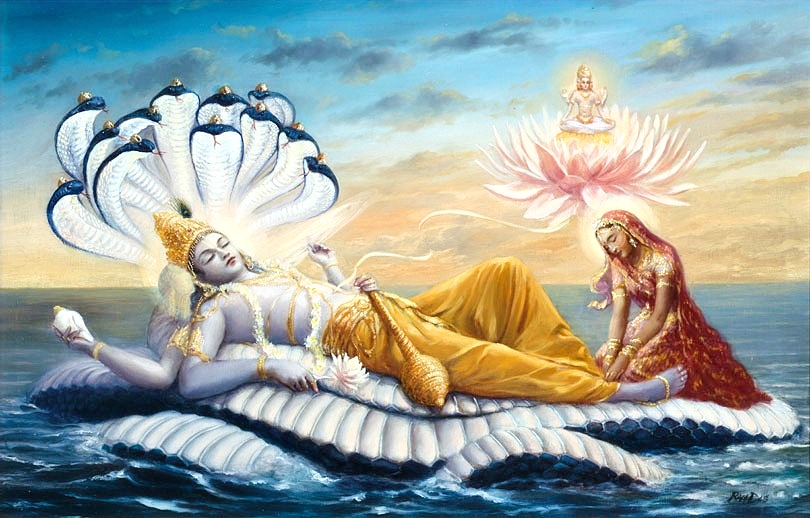
Saphala Ekadashi
Dec - Jan
Yudhisthira Maharaj said, “Dear Lord Krishna, what is the name of that Ekadashi which occurs during the dark fortnight of the month of Pausha (December-January)? How is it observed, please narrate these details to me so that I may understand.”
Sri Krishna then replied,
“O Yudhisthira, hear the glories of Pausha-krishna Ekadashi, which falls on a Dwadashi. For the benefit of humanity at large I shall describe the process of observing Pausha-krishna Ekadashi also known as Saphala Ekadashi. On this sacred day, one should worship Lord Narayana, for He is its ruling Deity.
On Saphala Ekadashi, My devotee should worship Me by offering Me fresh fruits and meditating on Me as the all-auspicious Supreme Personality. He should also offer Me incense and bright ghee lamps, for such an offering of lamps on Saphala Ekadashi is especially glorious. The devotee should try to stay awake throughout the night.
There was a city called Champavati, which was ruled by the saintly King Mahishmata. He had four sons, the eldest of whom, Lumpaka, was always engaged in sinful activities. Lumpaka also became very critical of the numerous devas, and every day he would go out of his way to blaspheme the Vaishnavas. At last King Mahishmata, seeing the fallen condition of his son, exiled him to the forest. Out of fear of the king, even compassionate relatives didn’t come to Lumpaka’s defense.
In exile, he schemed sinfully and thought, ‘I shall sneak back to the city under cover of darkness and plunder its wealth.’ He killed many animals by day, and by night he stole all manner of valuable items from the city. Though a meat-eater, Lumpaka would also eat fruits every day. He resided under an old banyan tree, that unknown to him happened to be very dear to Lord Vasudeva. In due course of time, while Lumpaka was doing so many sinful activities, the Saphala Ekadashi arrived. On the eve of the Ekadashi (Dashami), Lumpaka had to pass the entire night without sleep because of severe cold due to his scanty clothes. In fact all of that Ekadashi morning, he remained in that stupor and could not awaken out of his near-comatose condition.
When midday of the Saphala Ekadashi arrived, he managed to rise up from his place under that banyan tree. So weak was he that he couldn’t even go and kill even a single animal. He collected whatever fruits had fallen to the ground of their own accord. By the time he returned to his banyan tree home, the sun had set.
Placing the fruits at the base of the sacred banyan tree, Lumpaka began to cry out, ‘O Sri Hari, please be merciful to me and accept these fruits as an offering!’ Again he was forced to lie awake the whole night without sleep, but in the meantime, the all-merciful Supreme Personality of Godhead, Lord Madhusudana, had become pleased with Lumpaka’s humble offering of forest fruits. Lumpaka had unwittingly observed a full Ekadashi fast, and by the merit, he reaped on that day he regained his kingdom with no further obstacles.
As the sun rose on the day following Ekadashi, a horse approached Lumpaka and stood next to him. A voice suddenly boomed out saying, ‘This horse is for you, Lumpaka! Mount it and ride swiftly out of this forest to greet your family! By the mercy of the Lord and the merit you acquired by observing Saphala Ekadashi, go now to your father and enjoy your rightful place.’
By the merit he had earned by fasting on Saphala Ekadashi, he had become a handsome prince once more and was able to absorb his mind in the lotus feet of the Supreme Personality of Godhead.
Lumpaka offered his father, King Mahishmata, his humble obeisances and once again accepted his princely responsibilities. Seeing his son so decorated with Vaishnava ornaments and tilak, King Mahishmata gave him the kingdom, and Lumpaka ruled unopposed for many years.
O Yudhisthira, one who approaches Me as Lumpaka did will become completely free of lamentation and anxiety. Indeed, anyone who properly observes this glorious Saphala Ekadashi – even unknowingly, will become perfectly liberated at death and return to the spiritual abode of Vaikuntha. Moreover, one who simply hears the glories of Saphala Ekadashi obtains the same merit derived by one who performs a Rajasuya-yajna, and at the very least he goes to heaven in his next birth.”
Thus ends the narration of the glories of Pausha-Krishna Ekadashi, or Saphala Ekadashi, from the Bhavishya-Uttara Purana.